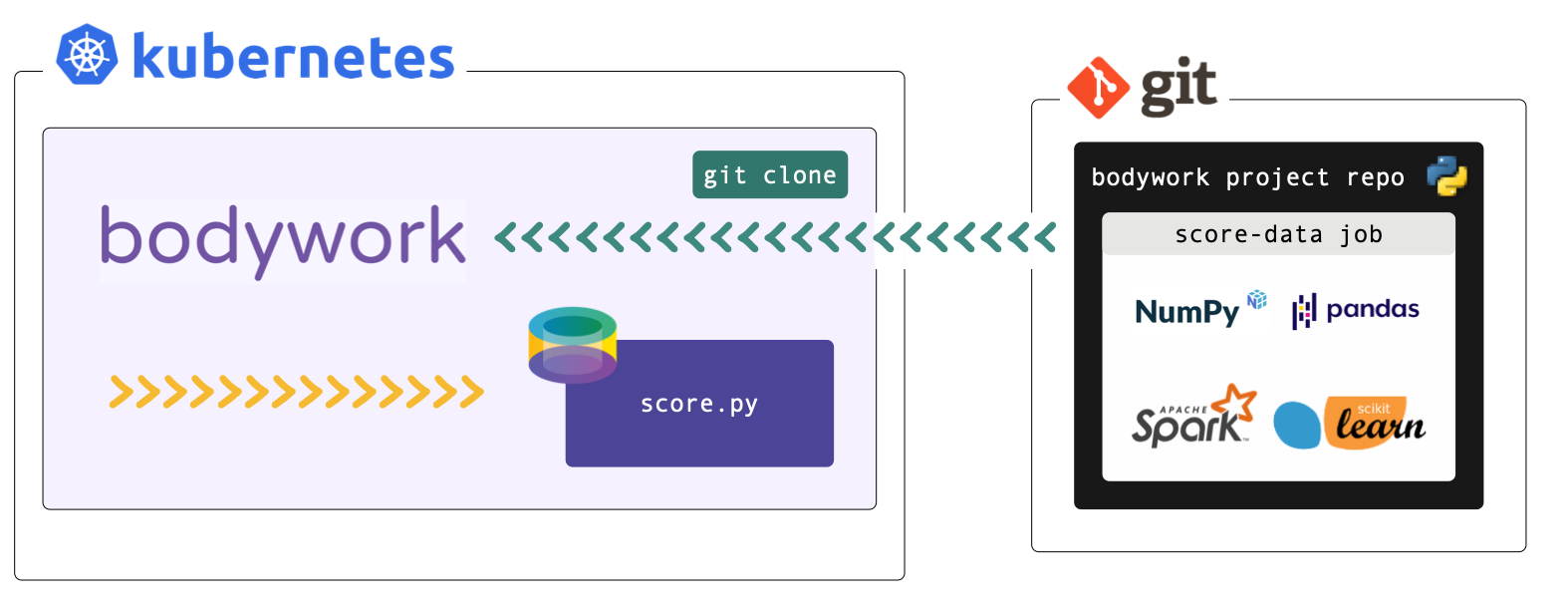Batch Workloads¶

What am I going to Learn?¶
- How to deploy a single stage pipeline to run a batch workload (or job) on Kubernetes.
- How to schedule this job to run on daily basis.
Before we Start¶
This tutorial refers to files within a Bodywork template project hosted on GitHub - check it out here. If you want to run the examples you will need to install Bodywork on your machine and setup access to Kubernetes (see the Kubernetes Quickstart for help with this).
We strongly recommend that you find five minutes to read about the key concepts that Bodywork is built upon, before beginning to work-through the examples below.
Working with private repositories
If you've cloned the example project into a private repository and intend to use this when following this tutorial, then you will need to be aware of the additional steps detailed here.
Example Job - Batch Inference¶
The example task that we want to deploy as a batch job, is to load a pre-trained model and use it to score a dataset. The latest dataset will be downloaded from cloud storage (AWS S3) and the pre-trained model will be bundled into the project's Git repository for convenience (not as a best practice).
The project for this single-stage pipeline is structured as follows,
root/
|-- score_data/
|-- score.py
|-- classification_model.joblib
|-- bodywork.yaml
Configuring the Job¶
All the configuration for this deployment is held within bodywork.yaml, whose contents are reproduced below.
version: "1.1"
pipeline:
name: bodywork-batch-job-project
docker_image: bodyworkml/bodywork-core:latest
DAG: score_data
stages:
score_data:
executable_module_path: score_data/score.py
requirements:
- boto3==1.21.14
- joblib==1.1.0
- pandas==1.4.1
- scikit-learn==1.0.2
cpu_request: 0.5
memory_request_mb: 100
batch:
max_completion_time_seconds: 60
retries: 2
logging:
log_level: INFO
The stages.score_data.executable_module_path parameter points to the executable Python module - score.py - that defines what will happen when the score_data (batch) stage is executed, within a pre-built Bodywork container. This module contains the code required to:
- download the new dataset from cloud storage (AWS S3);
- load the pre-trained model
classification_model.joblib; - score the dataset; and,
- save the results back to cloud storage (AWS S3).
It can be summarised as,
from urllib.request import urlopen
# other imports
# ...
DATA_URL = ('http://bodywork-batch-job-project.s3.eu-west-2.amazonaws.com'
'/data/iris_classification_data.csv')
# other constants
# ...
def main() -> None:
"""Main script to be executed."""
data = download_dataset(DATA_URL)
model = load(TRAINED_MODEL_FILENAME)
scored_data = score_data(data, model)
upload_results(scored_data)
# other functions definitions used in main()
# ...
if __name__ == '__main__':
main()
We recommend that you spend five minutes familiarising yourself with the full contents of score.py. When Bodywork runs the stage, it will do so in the same way as if you were to run,
$ python score.py
And so everything defined in main() will be executed.
The stages.score_data.requirements parameter in bodywork.yaml lists the 3rd party Python packages that will be Pip-installed on the container, as required to run the score.py module. In this example we have,
boto3==1.21.14
joblib==1.1.0
pandas==1.4.1
scikit-learn==1.0.2
boto3- for interacting with AWS;joblib- for persisting models;pandas- for manipulating the raw data; and,scikit-learn- for training the model.
Finally, the remaining parameters in stages.score_data section of the bodywork.yaml file allow us to configure the remaining parameters for the stage,
stages:
score_data:
executable_module_path: score_data/score.py
requirements:
- boto3==1.21.14
- joblib==1.1.0
- pandas==1.4.1
- scikit-learn==1.0.2
cpu_request: 0.5
memory_request_mb: 100
batch:
max_completion_time_seconds: 60
retries: 2
From which it is clear to see that we have specified that this stage is a batch stage (as opposed to a service stage), together with an estimate of the CPU and memory resources to request from the Kubernetes cluster, how long to wait and how many times to retry, etc.
Configuring the Pipeline¶
The project section of bodywork.yaml contains the configuration for the whole pipeline, which in this case consists of a single stage as defined in the stages.scoring_service section of bodywork.yaml.
pipeline:
name: bodywork-batch-job-project
docker_image: bodyworkml/bodywork-core:latest
DAG: score_data
The most important element is the specification of the workflow DAG, which in this instance is simple and will instruct the Bodywork workflow-controller to run the score_data stage.
Deploying the Pipeline¶
To deploy the pipeline, use the following command,
$ bw create deployment "https://github.com/bodywork-ml/bodywork-batch-job-project"
Which will run the pipeline defined in the default branch of the project's remote Git repository (e.g., master), and stream the logs to stdout - e.g,
=========================================== deploying master branch from https://github.com/bodywork-ml/bodywork-batch-job-project ============================================
[02/21/22 12:25:31] INFO Creating k8s namespace = bodywork-batch-job-project
[02/21/22 12:25:31] INFO Creating k8s service account = bodywork-stage
[02/21/22 12:25:31] INFO Attempting to execute DAG step = [score_data]
[02/21/22 12:25:31] INFO Creating k8s job for stage = score-data
...
You can also keep track of the pipeline's progress by using the Kubernetes dashboard and browsing to the namespace that matches the project name specified in bodywork.yaml - i.e., bodywork-batch-job-project.
Scheduling the Pipeline¶
If you're happy with the results of this test deployment, you can then schedule the pipeline to run on the cluster, on a schedule. For example, to setup the the workflow to run every hour, use the following command,
$ bw create cronjob "https://github.com/bodywork-ml/bodywork-batch-job-project" \
--name "hourly" \
--schedule "0 * * * *" \
--retries 2
Each scheduled pipeline execution will attempt to run the batch inference job, as defined by the state of this repository's default branch (e.g., master), at the time of execution.
To get the execution history for this cronjob use,
$ bw get cronjob "hourly" --history
Which should return output along the lines of,
run ID = hourly-1645446900
┏━━━━━━━━━━━━━━━━━┳━━━━━━━━━━━━━━━━━━━━━━━━━━━┓
┃ Field ┃ Value ┃
┡━━━━━━━━━━━━━━━━━╇━━━━━━━━━━━━━━━━━━━━━━━━━━━┩
│ start_time │ 2022-02-21 12:35:06+00:00 │
│ completion_time │ 2022-02-21 12:39:32+01:03 │
│ active │ False │
│ succeeded │ True │
│ failed │ False │
└─────────────────┴───────────────────────────┘
Then to stream the logs from any given cronjob run (e.g. to debug and/or monitor for errors), use,
$ bw get cronjobs hourly --logs "hourly-1645446900"